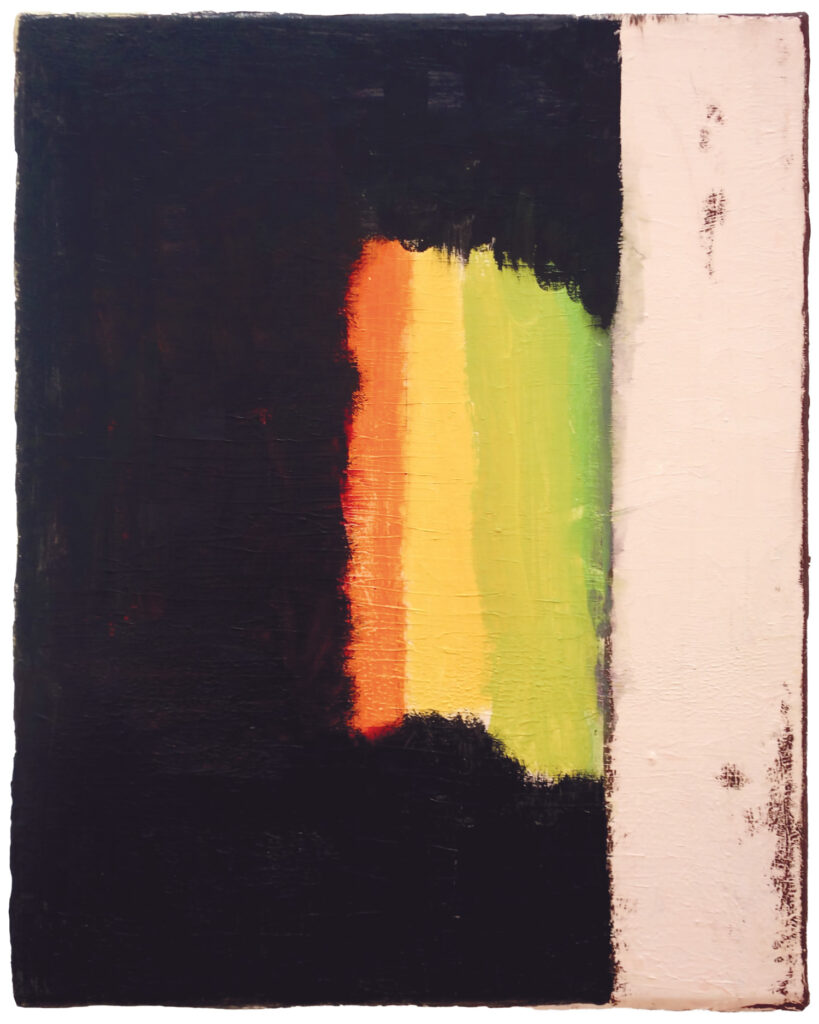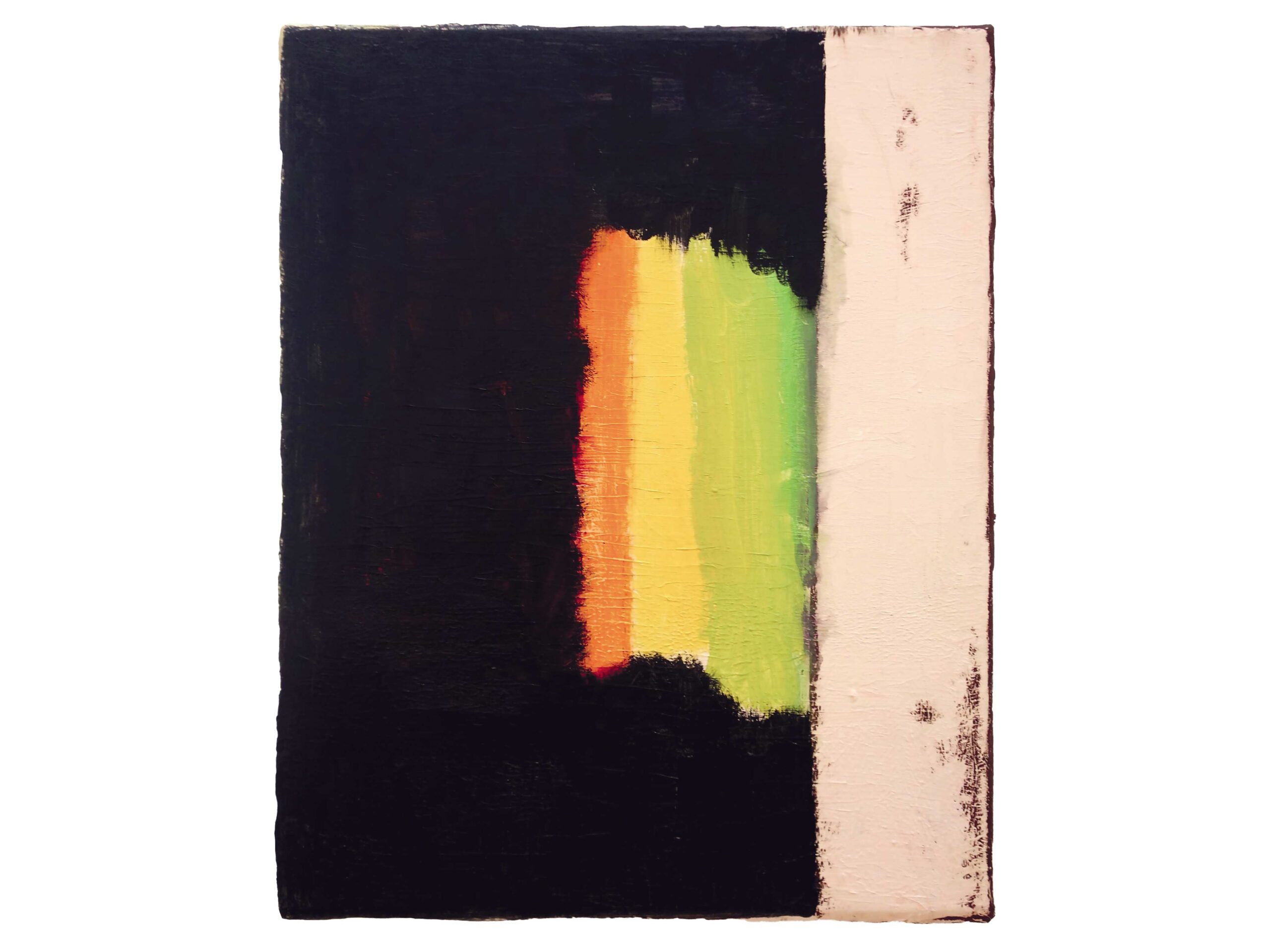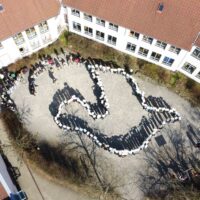When we look at a newborn infant, we experience an encounter with a personality. But an individual personality is not isolated – as the philosopher Hegel emphasized, we do not develop alone, but rather much that forms us has to do with those around us, with our destiny. From the beginning, a personality grows within a constellation of other personalities and in a variety of circumstances. What is less well known is that personality development is intimately related to the development of the immune system. Both of these developments do not begin at birth. In order to understand them, we have to look even further back—to pregnancy.
It is during pregnancy that we begin to develop and grow into our physicality. We are not alone then—as unborn children, we take in all the joy of our mother, her voice, her singing, and also her fears, as well as her stress, whenever that exceeds a certain level. Looking at an unborn child, we see an evolving body. The unborn child, with her or his tiny limbs, swims in amniotic fluid. We see their connection to the maternal womb and to their enveloping membranes. The outermost shell, the chorion, differentiates into an organ that is intimately connected with the mother: the placenta. This is the most important organ for the unborn child. From here children begin to build their individual body— which at the beginning of this development is almost completely upside down—and unfold a powerful nervous system. But the placenta has no nervous system or bones. All the blood of the unborn child rushes through the embryo in a single minute, and yet the blood crucially informs the embryo’s building processes. The placenta’s most important function is warmth regulation in the unborn child, the most important regulation of life. The unborn child’s body temperature, which is kept half a degree warmer than the mother’s, is regulated by the placenta. The placenta acts as a peripheral heart and it is the unborn child’s ‘peripheral central organ’, like the sun is to all life here on earth. The placenta is viable even without an embryo; it is directly attached to the mother. Only after birth does the brain take over the warmth regulation. What does that have to do with the immune system? We know that with a fever of 39 degrees (Celsius), our immune system is optimally efficient and that its performance depends on warmth. Even animals that depend on the environment for warmth seek warmer places when they are battling an infection, thereby increasing their chances of survival.
The placenta is an organ that naturally shields the child, at the same time creating a strong bond with the mother. The placenta is a border organ between mother and child. It forms protection through which the child is kept from experiencing absolutely everything the mother does. But this protection can be overpowered when there is overwhelming stress.
During the last trimester of pregnancy, the placenta develops a microbiome, a bacterial life. In this way, the child is already immunologically prepared for life outside of the mother’s womb. The human immune system matures when it encounters the microbial world. Decades ago, physicians still imagined the body as being sterile. Today we know that this is not the case. We carry bacteria in our lungs, on our skin, in our intestines, etc. Since 2014 it has been known that a bacterial flora develops in the placenta, too. Surprisingly, this microbiome of the placenta does not resemble the vaginal flora but the flora of the maternal oral cavity. Good dental health and a healthy diet can therefore indirectly affect the placenta.
Placenta as periphery incarnate
The placenta is relevant to the development of both our immune system and personality. But what is personality? What is the ‘I’ that we love to talk about? Rudolf Steiner says: ‘The I is something essential.’ It is a ‘being’, something that currently is not looked at in natural science. Furthermore, Rudolf Steiner indicated that ‘The central organ of the I during pregnancy is the placenta.’ The placenta is where the I dwells during pregnancy—with a completeness that we no longer have after birth.
As individuals, we are never as physically present as we are in this phase of life when we build up the whole physical body, which later becomes a mirror of ourselves, even if this is an unconscious presence. The placenta forms the starting point of our individual bodily development while also being an ‘I-organ’ that is completely fused with the mother’s organism. This is the starting point of the development of our personality and immune system. It is warmth that is central to all bodily processes. Where warmth is regulated, where the conditions of warmth are formed in our body, our I is present, actively forming the body. When we catch a cold, when we are not present, when we no longer sense our bodily organism because it has cooled down too much, foreign entities can settle in and alienate us from our bodies. Towards the very end of his life, Rudolf Steiner introduced the term ‘I-organization’ for the individual body-creating activity, the I activity. It is linked to the physical regulation of warmth, and the immune system is a definite expression of it. This brings us to what we call individual personality.
However, our warmth organization and many more of our bodily functions are not yet independently viable at birth. As human beings, we need the possibility to live with another person who connects with us, supports and attends to us, and with whom we can change, to a certain extent. Initially, the I can only be present in the individual body through this loving other, a ‘You’. In a particularly impressive way, this is what early childhood development shows us during pregnancy, but also after birth. The mystery of the I is a mystery of center and periphery. Everything that was contained as a function in the placenta, in the periphery of the body, develops into separate organs with different functions in the child’s body. In the placenta, everything was united, undivided, as in a Sun. In the new body, they become separate organs and earthly maturity arises. The placenta, this ‘pure’ dwelling of the I, will never arrive on earth. Finally, the child, under natural circumstances, initiates their birthing process through the placenta. This initiation of birth also initiates the death of the placenta.

Reflection begins in the gut
Human relationships are crucial for the immune system to develop. If we artificially separate children from their mother, at a time not chosen by them, it will have consequences for the immune system for many years. The immune system will not develop as well as it would otherwise. The differences are widely known today from studies of children born by planned cesarean section. In general, a good ‘me-to-you relationship’ between children and their parents, as well as other people, promotes the development of the immune system. Human neglect can have a particularly ‘toxic’ effect and increase stress levels.
The immune system is a digestive system, which develops from our main digestive system. It allows us to digest foreign matter anywhere in our body, not just in the gut. Two-thirds of our immune system always remains connected to the gut. The gut is the primary place where we internalize, break down, and transform something of the world and rebuild it within us. As is well known, the microbial life in our gut is of crucial importance for the functioning of our immune system.
In 1920, when hardly anyone could understand him, Rudolf Steiner pointed out in medical lectures that we internalize the microbial life of the intestine—that we draw some of the strength out of it, that our personality’s mental presence depends on the microbial life in our intestines. The brain, he said, was the reverse of the gut. At the time, the medical doctors present found his lectures completely incomprehensible. With current medical insights, it becomes clearer.
The normal architecture of the brain, especially the blood-brain barrier development, depends upon our intestinal flora and the substances—short-chain fatty acids—that we absorb from this flora. In a healthy situation, the intestinal flora is originally a gift given by the breastfeeding mother. Breast milk carries over 100 types of bacteria to the intestines. Nothing is sterile that used to be considered sterile. In dealing with this microbial life, the immune system also learns one of its most important skills: to stop and limit inflammation. We suffer or die from many diseases not because of the lack of activity of the immune system, but because of its never-ending or excessive activity, as seen in all chronic inflammation and autoimmune diseases. This is where our immune system is derailed because it doesn’t put limits on its own activity. Each of us acquires the ability to regulate these processes in the first few years of life by dealing with our own intestinal flora, especially in the upper part of the large intestine.
The higher self knows that it owes itself to the world. The question of You is a question of gratitude. The higher self is pure interest in and openness to the world.
We have a gastrointestinal tract in which, starting from the mouth, things only continue onwards – through to the small intestine, which sorts out what we can use from our food. But only higher animals develop a further stage of digestion, the large intestine, where our bacterial flora, our microbiome, develops. Here the food pulp is rhythmically pushed back and forth. In the large intestine, we accumulate substances that we cannot digest further but have to keep in us. The strongest impetus for developing the human brain comes from this large intestine. What happens there? We organically review what we have taken in from the outer world.
In doing so, we give space to other life: the microbial life within us. This microbial life depends very much on our diet, on how the intestinal flora is nourished, and how this foreign life can develop in us and form substances that decisively promote the development of the brain and the immune system. In the large intestine, a substantial basis for conscious personality development arises in the earthly realm. But digestion and intestinal flora are also of crucial importance for our immune system, a system that is extremely capable of learning unconsciously, and a system open to the environment. Within the first three years of life, the individual composition of our intestinal flora stabilizes. Every antibiotic treatment during this time has particularly lasting effects on this stabilizing process, which benefits from being therapeutically balanced.
The profound importance of sleep for the brain and the immune system also shows how our rhythm of life influences these organs and therefore the possibility of our bodily I-presence. As adults, there is also an organic effect from whether or not we do a conscious daily review. This process of reflection has the aim of consciously ‘digesting’ what we have experienced during the day, so we can hand it over to the night. This creates a moment of transition to detach from day-to-day business, to look back at it without consciously judging it. The judgment comes in the night from other beings whose task it is to do this, and who simultaneously give us the strength to create something positive from this process.
Health and the I—a creative performance
It is quite interesting that our I always reveals itself in activity, in its ‘performance’. For this process to function well, each I is dependent on the care of others. This care creates the social framework in which we live through disease processes, enhancing the inner, body-creating, preserving, and transformative activity. What we are used to calling ‘illness’ is actually an inner degradation and rebuilding process. The most important maturational processes of the immune system take place during illness. Without going through acute illnesses, our immune system cannot develop. Such illnesses are an exercise for the immune system, as long as it is not overwhelmed. If it is overwhelmed, external medical interventions aim to restore the possibility of recovery. Illness processes can also prompt essential mental maturation processes if good attention and care are given to them.
When talking about the immune system and personality development, we can ask ourselves: ‘What is health?’ A Dutch colleague, Machteld Huber, describes health as the ability to self-direct and adapt. In other words, health is not the absence of illness or well-being, but it is a ‘creative performance,’ something that is characteristic of the I. The ‘I’ as a being is a performer. This performing dimension of the ‘You’ —and therefore of the ‘I’—was been pointed out by Jürgen Habermas in his last major work, ‘Auch eine Geschichte der Philosophie’. Health is the question: to what extent can this personality, this ‘I’, orient itself, adapt, form, and develop out of itself in this life, at all levels: body, soul, and spirit? It’s about movement outside of oneself.
We know how easily the human Ego seeks to encapsulate within itself. It thinks, it imagines, it plans, it expects many things based on self-designed models. The higher I that Rudolf Steiner describes is open to or even fused to the world. The I knows it owes itself to the world. The question of You is a question of gratitude. Self-centered egocentrism experiences itself as limited within itself. The higher self is pure interest in and openness to the world. It’s the social ‘I’, able to relate to a You. Wolfgang Schad pointed out the parallel between this understanding of the ‘I’ and the organ of the placenta. We can learn much from this about how the I can fruitfully place itself into the world.
In embryonic development we find, on the one hand, the formation of biological inner spaces in the unborn child, on the other hand, the peripheral protection by the universal embryonic enveloping organs—the fetal membranes, the umbilical cord, and especially the placenta, which also consists of fetal tissue. Thus, the human organization before birth makes itself totally available for the construction of the individual bodily self. Thereby this organization forms a more complete corporeality, available for both human gestures as we find them evident in us after birth. In the embryo, we can see physically what we will become after birth, not bodily but spiritually. Likewise, we can reconsider our concept of health. We will not become healthier by trying to save our personal health. If we try to save our own health, we will lose it. And if we sacrifice our own health for the health of others we will keep it. Our personality and our immune system both develop most healthily through a healthy relationship with the world.
From this way of looking at things, natural science can develop that Goethe sought to initiate, a natural science-based upon the human I in its corporeal dialogue with the world, including the researchers themselves in all that they experience and research. Such a natural science builds a bridge towards morality, as Goethe attempted with his color theory. As a result of this, we can also understand an essential aspect of religious life. ‘Religio’ means re-connection, and the embryo is in a unique way physically (re-)connected to a ‘higher life’. We could also define religion as the long-term knowledge or long-term ability to foster life. We cannot create life, but rather we owe ourselves to life. Religion as our free, grateful relating back to the source of our life in its fullness of body, soul, and spirit, can connect our I in a unique way with the origin of our life in its physical, mental and spiritual dimension. If we remember the best thoughts of Hegel, Schelling, and Hölderlin, we can experience and practise the trinity of art, science, and religion in ourselves as care of soul, spirit, and life.













